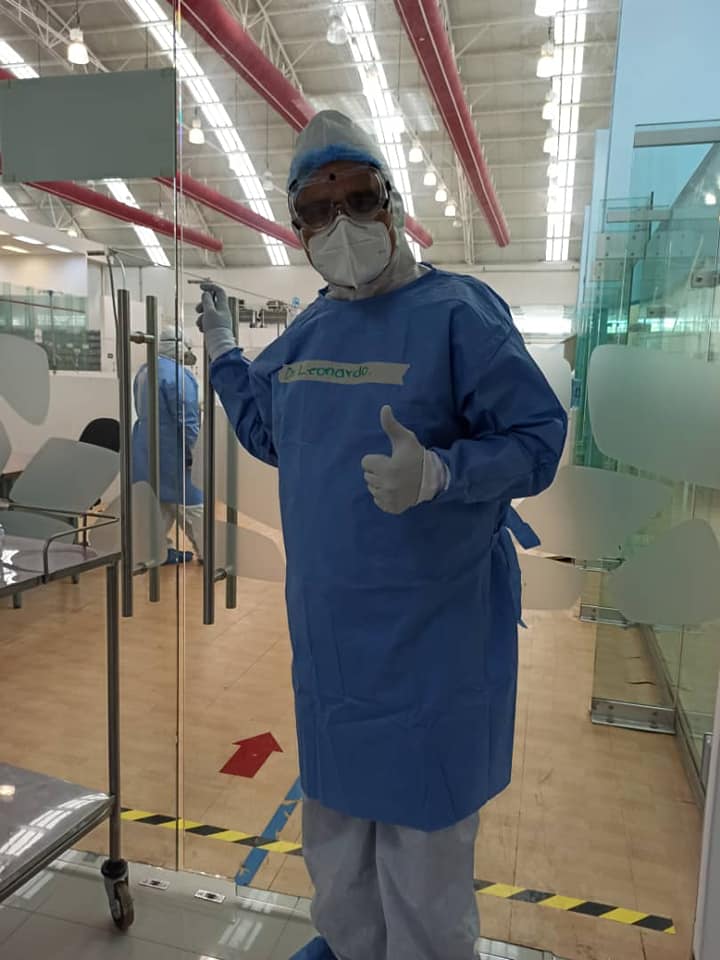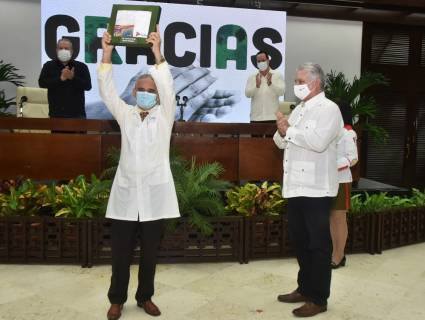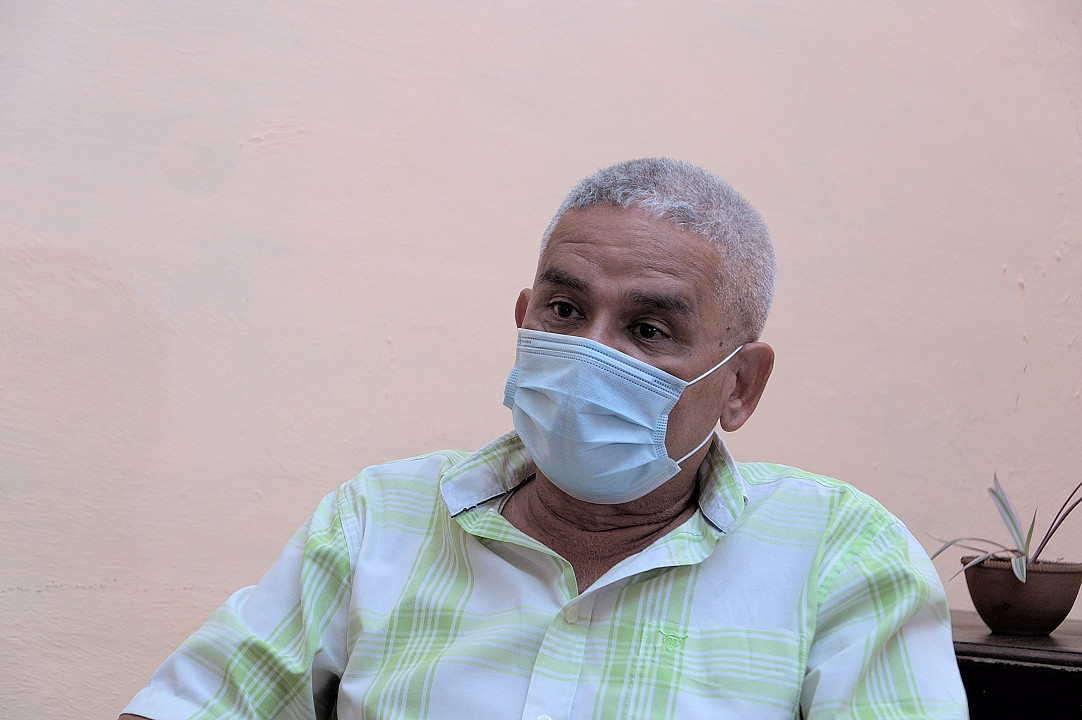Photos: Yoel Benítez Fonseca / Adelante and Courtesy of the interviewee
CAMAGÜEY.- For him I am “the girl”. She repeats the nickname by which my mother calls me with the right to "have seen you born" (as we say when we have known someone for a lifetime), and smiles at me as she sits down for a conversation agreed on that Sunday at the beginning of the year when they announced the departure the next day for Havana with a destination still unknown. That call has been repeated several times. "Leonardo called," says Mom, where she is going, I answer, with the certainty that she will never stop being where she should.
He prefers to do. He has never been one of those who wait, "things are done, without fanfare, that's better to say," she assures and his work attests to it. He does not like interviews because he does not find in him a greater work than the duty fulfilled and the retribution "to the Revolution, we owe it everything." That is why he hides behind the plural (which I allow myself to ignore when writing) to tell about his experiences for 34 years, when he became Dr. Leonardo Ramírez Rodríguez.
“When he started to study medicine, he didn't understand everything it meant. Today I tell you that there is no way to express what he feels if it is not by exercising it. All professions are precious but this one puts the human being at the center and there is nothing greater than his life. The vocation is fundamental, one is a doctor to serve and help ”.
That is why he gave himself up first, and because his academic results supported him, he was part, during the internship, of the Manuel Piti Fajardo contingent of rural doctors. “That is how my healthcare life began at the Lugareño hospital. I still feel a deep love when they tell me about there not only because I put the profession into practice for the first time but because I made friends who became family, when I see someone from the area it comforts me that they do not forget me. In that place I even gave birth, and there are many children of the time who are called Leonardo for that.
"Also, I'm from the Mario Muñoz movement." They say, I provoke him, that for that reason he never says no to a task. He laughs and his gaze reveals the hindsight, “that comes from further back-- and he moves his hands to reinforce the idea--, from the eternal debt we have with the Revolution of modestly and humbly reciprocating his efforts for training us ”. He is right, “from behind”, about the things that are lived in the house, about what he learned with his parents, Rosa, La China, and Carlos, Negrito… the people that he loves and respects the most.
His experience with the municipalities did not end in Minas, he was also in Nuevitas, and in both territories he assumed leadership responsibilities. Back at the provincial head he was director of the Maternal, Pediatric and Manuel Ascunce Domenech University Hospitals, of the Provincial Hygiene Center and Provincial Deputy Director of Medical Assistance.
For Dr. Leonardo directing has to be done by example. During those years he never stopped preparing, he became a specialist in Dermatology in 2001 and nine years later he obtained a master's degree in infectious diseases.
“Medicine, so beautiful, one realizes after so many years that it is wonderful from any position, in the care or directing valuable colleagues. But the first has never been lacking, for me it becomes a necessity, just like teaching.
“This job gets inside of you, it commits you, that is its greatness. In any part of the world it has the function of preventing and healing. However, revolutionary Cuban medicine has been identified by solidarity with the rest of the peoples. You have to live it to realize how colleagues from other nations see our doctors as examples. Because in our training, not only the high technical level prevails, but also sensitivity and altruism, feeling the problems of others as our own ”.
–You had the opportunity to verify these feelings in Equatorial Guinea (2004-2007) and in Venezuela (2015-2019), in the first as head of the mission and in the second as deputy national chief for medical assistance, teaching and hygiene and epidemiology.
–The missions constitute a school; the experience you gain, the exchange with specialists, because in none of them did my directing tasks take me away from case discussions, consultations ... You learn with each patient because each place, each scenario is different.
“Knowing the realities of other countries reaffirms Cuban health as unique. I have not seen a health system, nor a political will like that of Cuba to put the life of the human being above all ”.
And that is one of his greatest motivations: the country he lives in is also his family, “without it I would not have been able to do anything, not even be a doctor”, in which he is inspired “by those who are not there”, and I know that talks about his dad; and those around him like his mother, spouse and son. Among his pride is his militancy and the Che, "he was always where he was useful and he was also a doctor and an example in everything," and as one who does not realize it, he explains the mantra of life in passing.
 Courtesy of the interviewee
Courtesy of the interviewee
In this 2020, at 57 a new test had to overcome just five months after his return from Venezuela. The coronavirus was gaining strength on the continent, and the brigades were once again enlisting. In less than 24 hours he was in Havana, more than a month later he left for Veracruz, Mexico, in front of more than 280 collaborators.
“I paid off a debt that I had. In September 2005, when the Commander created the ‘Henry Reeve’ he was in Havana for a meeting of heads of mission, at that time he was working in Guinea, and he invited us to the Sports City to the event where he left the contingent constituted. I had to wait 15 years to be part of it, it was something I had to do, I couldn't stay as a spectator of that event, I owed it.
“It is a very different experience; in a short time, a very intense level of work, added to the constant risk to life. It was necessary to provide medical assistance with the required quality but to respect strict biosafety protocols.
“Our doctors were all the time in the Red Zone. Deployed throughout the state, 48,000 patients were treated in 11 hospitals, three of them extended medical care centers. It was very stressful, but we have the satisfaction of having fulfilled the mission and we all returned without getting sick.
“Mexicans boast of the ties that unite Veracuz and Cuba, Martí entered the country through the port of that state, the historic center is very similar to Old Havana and it is very exciting to visit Tuxpan. The brigade of nine collaborators that was there experienced the emotion of celebrating July 26 in those lands; its inhabitants say with pride that the Granma came from there. Those experiences are overwhelming ”.

–The mission in Veracruz had two singularities, it was one of the largest that faced SARS-CoV-2 outside of Cuba, it left for three months and returned after five.
–That shows the high recognition of our work, of the dedication of the staff who put their lives at risk every day. At the end of August we had to return, but at the beginning of the month when we met together with the Cuban consul and the Governor to explain the results of the work, he asked us to stay for two more months.
“At the moment it was a very strong impact. After a very difficult mission as who says we already felt at home. When the extension was confirmed from Cuba, we had to go to each of the places where the collaborators were.
“First, as in any Cuban mission, it started from voluntariness, whoever wanted it was given the opportunity to return. There we received another incentive. Only five came, and for health problems. Even a doctor who underwent surgery there told me "I don't want to leave," but her recovery should be done here.
“This extension proved the quality of the service. At the farewell, they highlighted the disposition, the principles and the dedication of ours, the values are put to the test in missions like this one ”.

On October 28, they arrived at "the most beautiful land in the world." They arrived in the afternoon, when the Cuban sun warms up the most. A few hours before the event was broadcast on the national network. The cell phone rang at home and my mother, who had been praying in her name for six months, only managed to shout with happiness when the voice on the other side only said "I'm in Cuba, see you soon."
The cameras captured the wide smiles at the airport, during the meeting with the President they kept the memories and once again the commitment.
Already in the terroir, Dr. Leonardo keeps busy on vacation, he knows that time cannot be wasted. At the beginning of the year "when I came back from Venezuela I couldn't stand it and I went to the hospital to visit the visitors, to see the residents, the patients, the teachers."
With more than thirty years dedicated to Medicine, most of them with administrative responsibilities, it seems that Dr. Leonardo Ramírez has achieved everything.
Leo, as I allow myself to call him only at the end of this exercise, is a being of light. He is always preceded by his righteousness and his surrender. A scolding from him is the hardest knock that many have received, his hand on his shoulder is the most sincere gesture possible. All of him inspires, because he is one of those that is not lacking.
“I still have a lot to do. As long as I am healthy, I will look for a way to be useful and I will try to be in the group of those who contribute to the Revolution ”, that major work that conforms to the mission of serving as men like the son of the China and Negrito.
Translated by Linet Acuña Quilez

